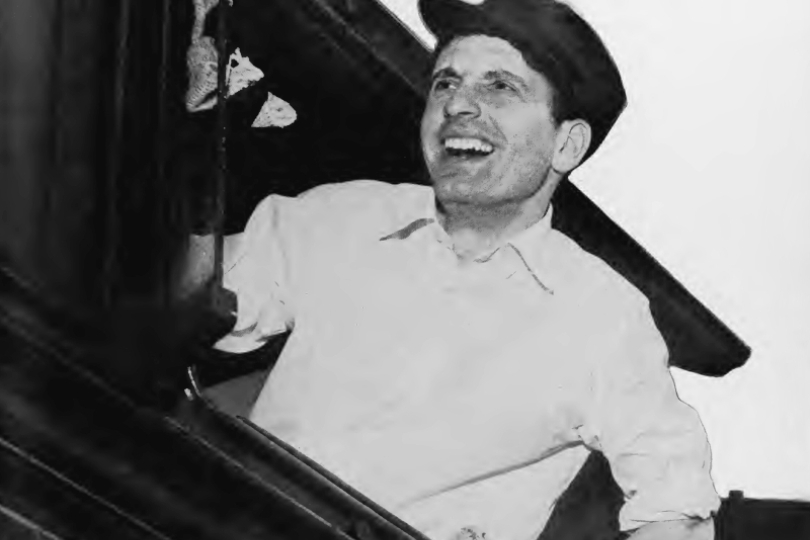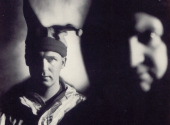
Milestones in Music History #54: Lonnie Donegan, The Man Who Shaped Modern Music
The new universe of sounds and synths that Tonto's Expanding Head Band let us into, the protagonists of our last episode, might have created the illusion that going any further would be musically impossible. Yet it must be admitted that a few years earlier, in Scotland, a man was born who contributed to the experimentation of the 1970s and had his hand in introducing the Brit sound to the world. But he also did something else – he shaped the sound of our times. This man was called Anthony James Donegan.
The evolution of music from the 1950s to the present day has been marked by revolutionary discoveries in the field of technology, which have improved musical composition, and by the emergence of countless genres and sub-genres (a process that is never-ending, right up to the present day).
But every time a limit has been crossed, every time a limit has been dared, every time a limit has been broken through there has always been a mastermind behind it. A brilliant and far-sighted mind with the ability to explore the present, study the past, to shape the future.
Probably the first source of inspiration for Anthony James Donegan, known to the whole world as Lonnie Donegan, was his father, Peter John Donegan, a professional violinist who had played in the Scottish National Orchestra. The family lived in Bridgeton, Glasgow district, but when Lonnie was two years old, they moved to Essex, East Ham. But it did not last long.
In fact, due to the Blitz during the Second World War, Lonnie was evacuated and had to move to different cities, getting closer and closer to London. He did not have a very peaceful childhood, so he had the opportunity to get to know the world of music. He became interested in country and jazz, but also in the blues, of which he particularly appreciated artists such as Josh White and Frank Crumit.
Perhaps it was the blues that motivated him to buy a guitar when he was 14, in 1945. He also became acquainted with music from overseas thanks to BBC radio programs and learned to play songs such as "Puttin' On the Style" (a hit of those years composed by Marion Try Slaughter, better known as Vernon Dalhart), the traditional American song and murder ballad "Frankie and Johnny", and "The House of the Rising Sun", a traditional folk song that would become timelessly famous over the decades.
His talent showed itself immediately; he started playing in various clubs in London, dabbling with the guitar, and became an excellent player, so that he was noticed by Chris Barber. He had heard that he was a good banjo player and for this reason he wanted to audition Lonnie. The truth is, Lonnie had never played banjo in his whole life. However, he bought one just for that purpose and the audition went great.
He thus began playing with Barber's jazz band, but unfortunately, a call to National Service interrupted his collaboration with the band. He did, however, find a way to continue listening to overseas radio, and even played during his military service in a local pub in Southampton, where he was based, with Ken Grinyer's Wolverines Jazz Band.
Finally, in 1952 he had the opportunity to form his act, the Tony Lonegan Band, which played gigs around London until opening for the famous blues musician Lonnie Johnson in the same year. He took his name as a tribute, Lonnie, which he began to use shortly afterwards. The following year, however, the band performed under the name Ken Colyer's Jazzmen, in honour of cornetist Ken Coyler, who had been imprisoned for visa problems in New Orleans, and upon his return to Britain had joined Chris Barber's band.
They played a concert in Copenhagen and the next day the first studio work of Lonnie's compositions, Ken Colyer's Jazzmen and the Monty Sunshine Trio was recorded by jazz producer Christiern Gunnar Albertson, for Storyville Records, a Danish label specialized in jazz and blues music. But at the same time, Lonnie Donegan, a restless genius, concentrated on improving his musical technique.
Starting from the basics of Dixieland jazz music, which compared to traditional jazz was more dynamic and related to swing and bebop, but evolved its sounds in a more complex way, which certainly came close to rhythm and blues, and are probably the first pure forms of rock and roll. And he did it all using only an extremely cheap Spanish guitar alternating with a banjo, a washtub bass, and a simple rudimentary washboard for percussion. That was it.
Thus, the first recordings under his name were released, which made his qualities known to the world. In July 1954 a faster version of Lead Belly's American folk song "Rock Island Line" was released, the original version of which had been written in 1929 by Clarence Wilson, but whose first recording dates back to 1934, made by prisoners at Cummins State Farm in Arkansas.
The B-side featured "John Henry", a legendary American folk hero whose existence is still in doubt. Although Lonnie didn't make any money, as the recording rights belonged to the band, the single was hugely successful in America and England. The king of Skiffle was born, the name with which his genre was now defined – a mixture of Dixieland, rhythm and blues, and jazz.
Also, in the same year his next single, "Diggin' My Potatoes", was released by Decca, who however dropped him soon after. Not to the detriment of Lonnie, who managed to sign with Pye in 1955 and release his next single, "Lost John", which reached number two in the UK charts. The summer of the following year saw the release of his debut album, Lonnie Donegan Showcase, which inaugurated the skiffle genre and was a resounding success.
The album contained songs by Leroy Carr and Lead Belly, plus the songs "Wabash Cannonball" and "Ramblin' Man". The album sparked the birth of a sequel to Lonnie's style, and from there the Quarrymen, John Lennon's first group, was even born. In 1957 other hit singles were released such as "Gamblin' Man"/"Puttin' On the Style", and the skiffle version of Hank Snow's country song "Nobody's Child".
By 1960 Lonnie released other hit singles, "Cumberland Gap", "My Old Man's a Dustman" (which was closer to music hall, and therefore not a hit with his hardcore skiffle fans), and "Does Your Chewing Gum Lose Its Flavor (On the Bedpost Overnight?)", which was his biggest hit in the United States.
His last hit single in the UK charts was "Pick a Bale of Cotton", a folk and work song originally recorded by Texan convicts James "Iron Head" Baker and Mose "Clear Rock" Platt and later made famous by Lead Belly and then Johnny Cash. Lonnie continued to perform and publish during the 60s and the second half of the 70s, but he had already made history.
As someone like Paul McCartney said some time ago: "He was the man"; and more recently Jack White: "Remember, Lonnie Donegan started it for you". If it hadn't been for Lonnie Donegan, we wouldn't have had modern rock, pop, and Brit-pop, and Skiffle would never have existed. What the heck, without Lonnie the Beatles wouldn't even exist.
An icon and fundamental artist to understand the development of contemporary music, he left a priceless legacy, and many artists are indebted to him. Apart from the above-mentioned, many others have paid tribute to him, including Al Stewart and Mark Knopfler; the latter included a piece entitled "Donegan's Gone" in his 2004 album Shangri-La, in memory of the great master.
Lonnie Donegan has contributed like few others to the musical world; his versatility of technique and composition, albeit with the use of little and expensive instrumentation, has defined the sound of today's music, and will still be an inspiration for future generations. Such bravery has been shown by few in history, as was Sparks, the protagonist of our next episode of Milestones.
How did Lonnie Donegan influence music today? Nowadays, is it still possible to compose and amaze with few means available? Does Britpop still exist? And how did Skiffle evolve? Will there ever be someone like Lonnie?
Leave your opinion in the comments below!
If you have found an error or typo in the article, please let us know by e-mail info@insounder.org.





